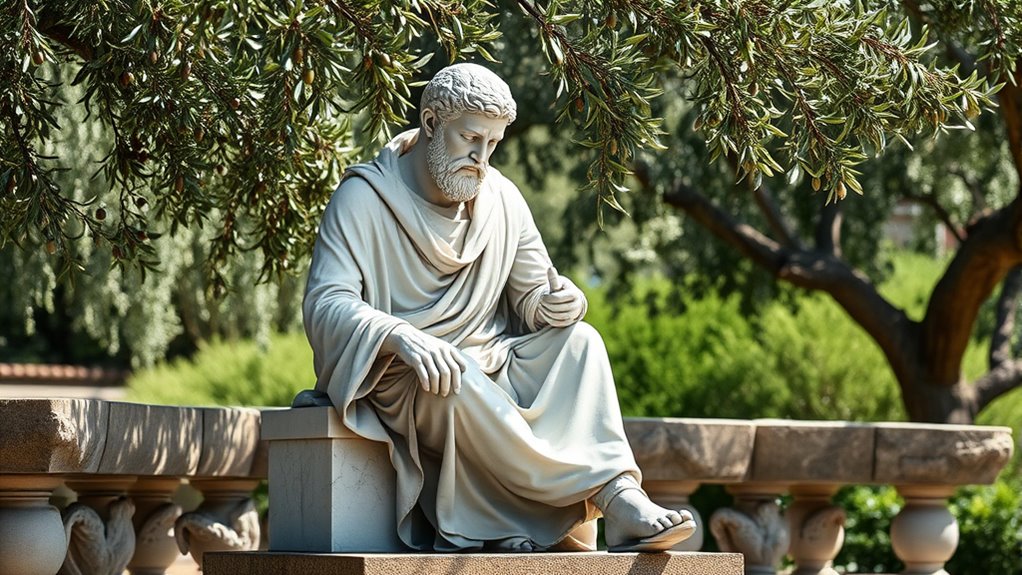Stoicism roots itself in ancient Greek philosophy, emphasizing reason, virtue, and harmony with nature, ideas developed by Socrates, Plato, and Aristotle. Zeno of Citium, the founder, built on these traditions, especially focusing on logos and moral self-control. The philosophy spread across Greece and into Rome, influencing thinkers like Seneca and Marcus Aurelius. If you explore further, you’ll discover how these ancient ideas continue to shape modern resilience and self-discipline practices.
Key Takeaways
- Stoicism originated from Greek philosophy emphasizing reason, virtue, and living in harmony with nature.
- It was influenced by Socratic ideas of moral self-examination and pursuit of moral truth.
- Core principles include cultivating wisdom, self-control, and resilience through rational understanding.
- Zeno of Citium developed Stoic doctrines, integrating logic, natural philosophy, and ethics rooted in Greek thought.
- Greek philosophical concepts of virtue and moral integrity underpin Stoic ethical foundations and practical guidance.
The Origins of Stoicism in the Context of Ancient Greek Thought
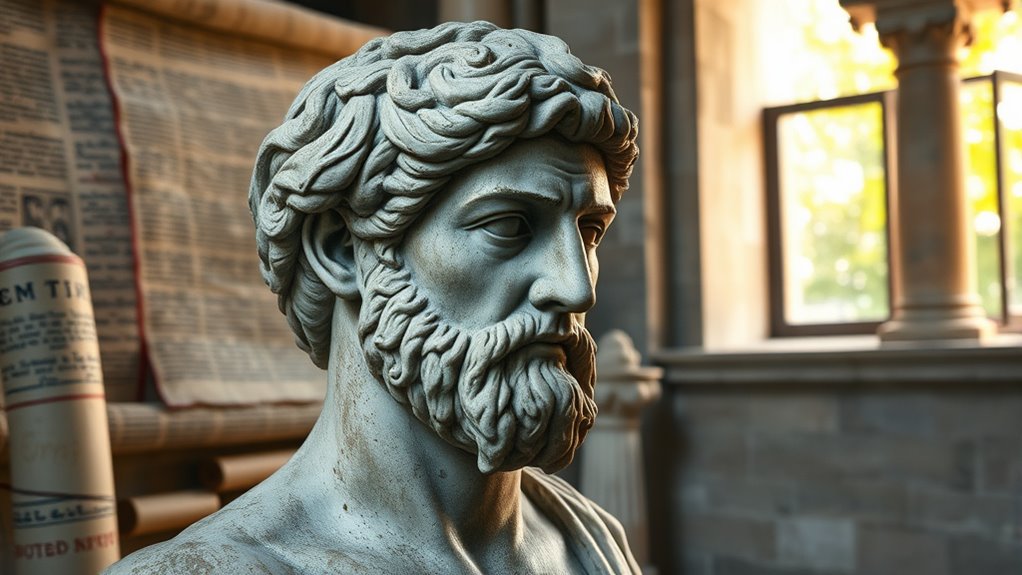
Ancient Greek philosophy laid the groundwork for Stoicism by emphasizing reason, virtue, and the pursuit of a good life. You’re encouraged to understand that thinkers like Socrates, Plato, and Aristotle shaped ideas about how humans should live. They stressed the importance of rational thought, moral integrity, and harmony with nature. Additionally, the Greeks developed cryptic concepts that emphasize self-control and resilience, which are central to Stoic practice. These principles influenced later philosophies that focused on personal virtue and emotional resilience. Greek philosophers believed that living in accordance with reason leads to true happiness, guiding individuals to cultivate wisdom and self-control. Furthermore, the Greeks explored moral virtues that underpin the ethical framework later adopted by Stoic thinkers. This intellectual environment fostered a culture that valued ethical behavior and the pursuit of excellence. By building on these ideas, Stoicism emerged as a practical philosophy aimed at helping you navigate life’s challenges with virtue and rational calm. The emphasis on self-discipline and emotional regulation became key components of Stoic teachings, drawing directly from Greek ethical thought. Modern interpretations of these ideas continue to highlight the importance of rational control in achieving personal peace and resilience.
Zeno of Citium and the Founding of Stoic Philosophy

Zeno of Citium’s background shaped the ideas he’d develop into Stoic philosophy, emphasizing resilience and virtue. His core principles focus on living in harmony with nature and controlling your reactions. These ideas left a lasting mark, influencing later thinkers and shaping the course of Western philosophy. Additionally, Stoicism’s emphasis on emotional resilience has contributed to its enduring relevance in modern self-help and psychological practices.
Zeno’s Life and Background
Born in the city of Citium in Cyprus around 334 BCE, Zeno of Citium faced a difficult early life marked by tragedy and hardship. His father died when he was young, and he struggled to support himself.
After a shipwreck, he lost his belongings and was forced to start over. To escape his circumstances, you might think he turned to philosophy, which was gaining popularity in Athens.
There, he studied under various teachers, absorbing different ideas before developing his own approach. Zeno’s background of adversity shaped his belief in resilience and self-control.
His experiences pushed him to seek a practical philosophy that could help him and others live ethically and calmly amid life’s challenges. This determined outlook laid the groundwork for Stoic philosophy’s emphasis on virtue and inner strength.
Core Stoic Principles
At the heart of Stoic philosophy are its core principles, which emphasize living in harmony with nature, cultivating virtue, and developing inner resilience. These ideas guide your pursuit of wisdom, courage, justice, and temperance. Zeno of Citium founded Stoicism on the belief that reason and virtue are the paths to true happiness. The table below summarizes the key principles:
| Principle | Focus | Goal |
|---|---|---|
| Living in harmony | Align with nature and reason | Inner peace and resilience |
| Virtue | Cultivate wisdom, justice, temperance | Moral excellence and fulfillment |
| Inner resilience | Accept what you cannot control | Emotional strength and calmness |
Understanding how these principles are rooted in ancient Greek philosophy can deepen your appreciation of their timeless relevance. Recognizing that Stoic teachings also encourage mindfulness helps practitioners maintain perspective amidst life’s challenges. Additionally, the emphasis on rational thought underscores the importance of logical reasoning in achieving a balanced life. The Stoic focus on self-discipline further supports the development of emotional strength and perseverance during difficult times. Moreover, studying the founders of Stoicism such as Zeno, Cleanthes, and Chrysippus reveals how these core ideas were systematically developed and passed down through generations.
Influence on Later Philosophy
The founding of Stoic philosophy by Zeno of Citium marked a pivotal moment that shaped the course of Western thought. Your understanding of resilience, virtue, and rationality stems from its influence. Stoicism’s ideas spread through Rome, impacting thinkers like Seneca, Epictetus, and Marcus Aurelius. Their writings emphasized self-control, ethical living, and acceptance of fate, shaping Christian and later philosophical doctrines. The Stoic focus on internal virtue over external circumstances laid groundwork for modern psychology and ethics. You can see Stoic principles in contemporary self-help, mindfulness, and resilience strategies. Its emphasis on rationality and virtue continues to influence philosophical debates about morality, human nature, and how to live a meaningful life. In fundamental terms, Zeno’s teachings have left an enduring mark on Western intellectual history. Additionally, the emphasis on natural materials and simple, authentic living in farmhouse design echoes the Stoic appreciation for harmony with nature and authenticity in life. A deeper understanding of aquatic environments and their influence on human well-being further highlights the importance of water in fostering resilience and mental clarity, as access to freshwater sources has historically been vital for communities’ health and sustainability. Recognizing the role of mental discipline in Stoic practice underscores the importance of cultivating inner strength and emotional regulation in facing life’s challenges. Moreover, the integration of mindfulness practices within Stoic exercises demonstrates how ancient techniques continue to inform modern approaches to emotional resilience and mental clarity.
The Influence of Socratic Ideas on Stoic Ethics
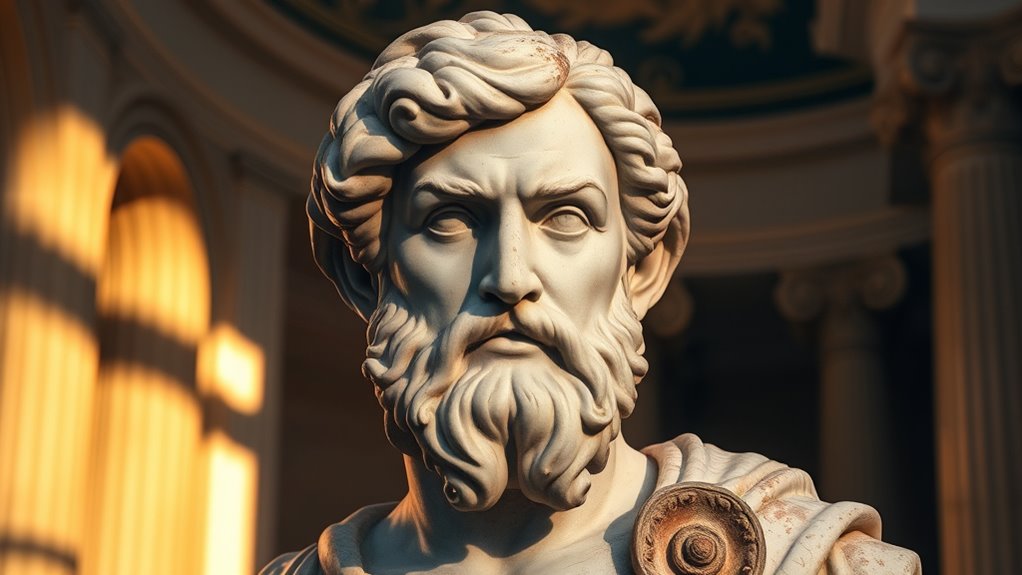
Have you ever wondered how Socratic questioning shaped the ethical outlook of later philosophers? Socrates emphasized the importance of self-examination and recognizing one’s ignorance. This approach encourages you to seek moral truth through persistent questioning, rather than accepting superficial answers. Engaging in expert voice actors and immersive soundscapes can deepen understanding of complex ideas, much like how Socratic dialogue fosters deeper insight. His focus on virtue as knowledge influences Stoics, who believe that living in harmony with nature requires understanding what’s truly good. The Socratic method pushes you to challenge assumptions and pursue moral clarity, which aligns with Stoic ideals of wisdom and self-control.
Furthermore, the emphasis on self-awareness in Socratic method directly supports the Stoic pursuit of inner tranquility through clear comprehension of one’s moral duties. Recognizing the importance of ethical self-examination helps in cultivating virtue, a cornerstone of Stoic philosophy that underscores the significance of continuous moral reflection. Additionally, the use of logical reasoning in Socratic questioning provides a foundation for the Stoic emphasis on rationality as a means to achieve moral virtue. Understanding that justified beliefs are essential for moral development further connects Socratic ideas to Stoic practices, highlighting the importance of well-founded knowledge in ethical living.
The Role of Aristotle’s Virtue Ethics in Shaping Stoic Values
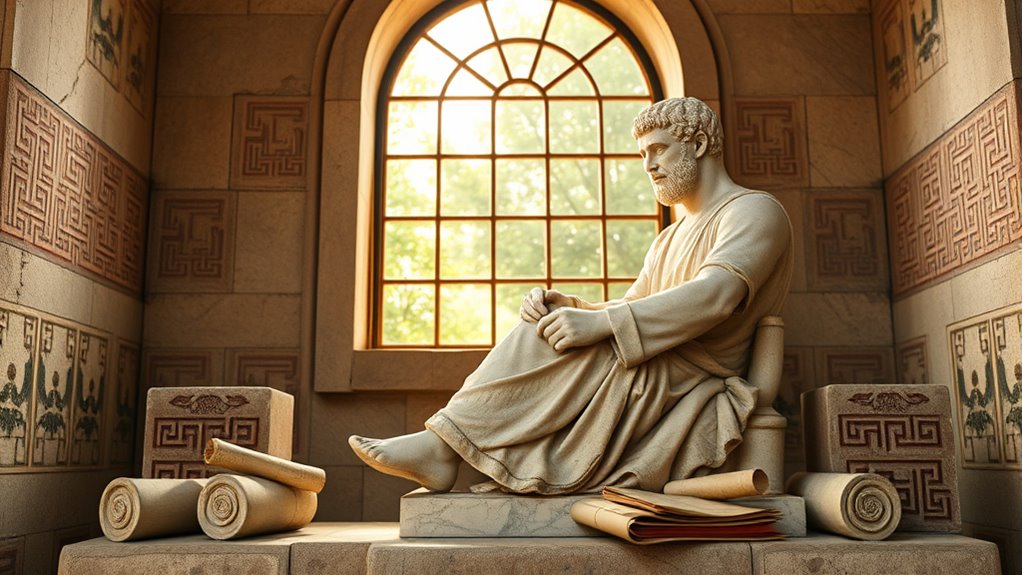
Aristotle’s virtue ethics profoundly influenced Stoic values by emphasizing the development of moral character through practical wisdom and virtuous habits.
Aristotle’s virtue ethics shaped Stoic ideals by highlighting moral character, wisdom, and virtuous habits as keys to a good life.
You learn that cultivating virtues like courage, temperance, and justice is essential for living a good life. The Stoics adopted this focus, seeing virtue as the highest good and central to their philosophy.
They believed that living in accordance with nature and reason leads to true happiness.
To deepen your understanding, consider these points:
- Virtue as a balanced mean between excess and deficiency.
- Practical wisdom (phronesis) as guiding moral decisions.
- The importance of habit in shaping character and virtue.
The Development of Stoic Logic and Natural Philosophy

You’ll see how the Stoics built a logical system to understand the world and explain natural phenomena. Their methods influenced later philosophers and shaped ideas about reason and science. Additionally, their emphasis on logical reasoning helped establish a foundation for scientific inquiry and rational analysis that persists in modern philosophy. This systematic approach contributed to the development of testing methodologies in understanding complex natural processes. Their focus on empirical observation and logical deduction laid the groundwork for scientific methods used today. Furthermore, their cultivation of creative practice encouraged innovative approaches to understanding natural laws and phenomena.
Evolution of Logical Systems
The development of Stoic logic marked a significant shift in ancient philosophical thought, as the Stoics sought to create a systematic approach to understanding reasoning and natural phenomena. They aimed to establish a clear framework for identifying valid arguments, understanding causality, and explaining the universe.
Their logical system focused on propositional logic, emphasizing the relationships between statements rather than individual concepts. To deepen your understanding, consider:
- How Stoic logic integrated with their ideas of ethics and the cosmos.
- The role of *pistis* (trust) and *logos* (reason) in their reasoning process.
- The influence of their logical principles on later philosophical and scientific thought.
This approach helped shape the foundation for modern logic and natural philosophy, emphasizing coherence and rational order.
Natural World Explanations
Building on their logical frameworks, the Stoics sought to explain the natural world through a rational and interconnected system. They believed everything in nature operates according to divine reason or logos, which unites all things.
You’ll find that they viewed the universe as a living, purposeful organism, where each element has a role in maintaining harmony. The Stoics rejected mythological explanations and emphasized observable phenomena, using reason to understand nature’s laws.
They argued that matter is composed of active and passive principles, with the active guiding the passive to form the cosmos. This natural philosophy reflects their belief that understanding the universe’s rational order helps you align your life with nature’s inherent harmony, fostering resilience and virtue amidst life’s uncertainties.
Influence on Later Philosophy
The influence of Stoic philosophy on later thinkers is especially evident in the development of their logical methods and natural philosophy, which laid foundational ideas for subsequent Western thought.
You can see their impact in how logic evolved as a formal tool for reasoning, shaping medieval and modern logic. Additionally, their natural philosophy introduced concepts of the universe governed by rational laws, influencing scientific approaches.
To deepen your understanding:
- The development of propositional logic, emphasizing the relationship between statements.
- The integration of ethics and physics, highlighting the interconnectedness of nature and morality.
- The idea that the universe operates according to rational principles, inspiring later natural sciences and cosmology.
These ideas continue to echo through philosophical and scientific traditions today.
The Key Concepts of Stoicism: Logos, Virtue, and Nature

Understanding the key concepts of Stoicism can deepen your appreciation for its practical wisdom. Logos, virtue, and nature form the foundation of this philosophy.
Logos refers to the rational order of the universe, which guides everything, including your thoughts and actions. Recognizing this helps you align your life with nature’s natural flow.
Virtue, the highest good, involves qualities like wisdom, courage, justice, and self-control. Practicing virtue means living in harmony with Logos and acting ethically.
Nature, in Stoic thought, is both the universe and your true nature. Embracing this idea encourages you to accept what you can’t change and focus on cultivating inner resilience.
Prominent Stoic Thinkers: Cleanthes, Chrysippus, and Later Philosophers

Prominent Stoic thinkers have shaped the philosophy’s development and helped spread its ideas throughout history. You’ll find that figures like Cleanthes, Chrysippus, and later philosophers built on earlier teachings and expanded Stoicism’s scope.
Cleanthes, as Socrates’ successor, emphasized living in harmony with nature and developed the famous “Hymn to Zeus,” reflecting divine reason.
Cleanthes emphasized harmony with nature and composed the renowned Hymn to Zeus, celebrating divine reason.
Chrysippus, often called the second founder, systematized Stoic logic and ethics, making the philosophy more rigorous.
Later philosophers like Epictetus and Marcus Aurelius adapted Stoicism for everyday life, emphasizing resilience and virtue.
The Spread of Stoic Philosophy Across the Hellenistic World
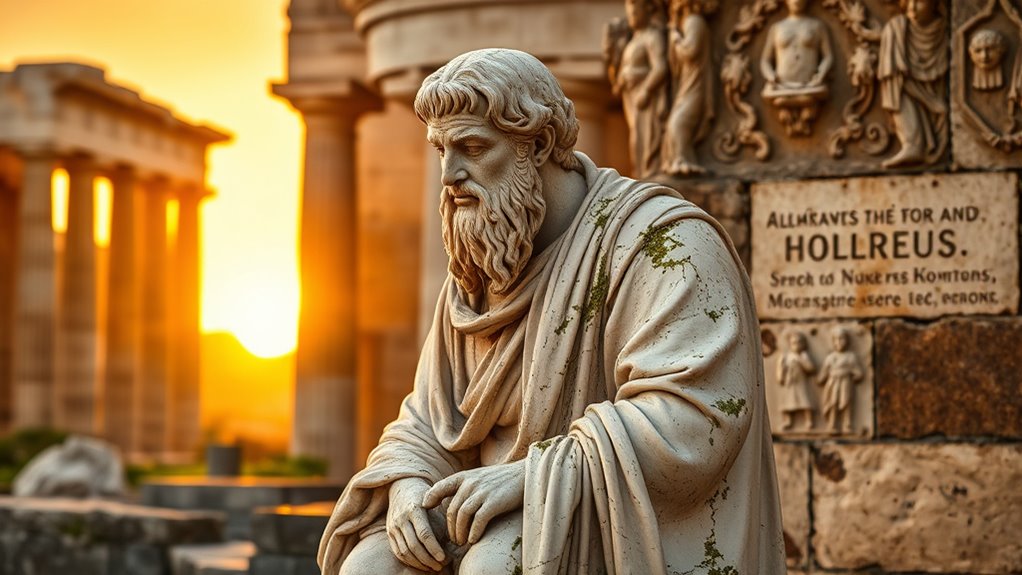
As Stoic philosophy developed in Athens, it quickly spread across the Hellenistic world, reaching diverse regions and audiences. You’d see its principles adopted by rulers, scholars, and common folk alike. Its practical focus on virtue and resilience resonated across cultures and political structures. The table below highlights key areas where Stoicism expanded:
| Region | Influence |
|---|---|
| Egypt | Integration with Egyptian thought |
| Asia Minor | Adoption by local elites |
| Rome | Philosophical and political integration |
| Mediterranean | Spread through trade and education |
This widespread dissemination helped Stoicism evolve, adapt, and influence societies far beyond its Greek origins, shaping ideas of virtue, duty, and self-control across the Hellenistic world.
The Legacy of Ancient Greek Philosophy in Modern Stoic Practice
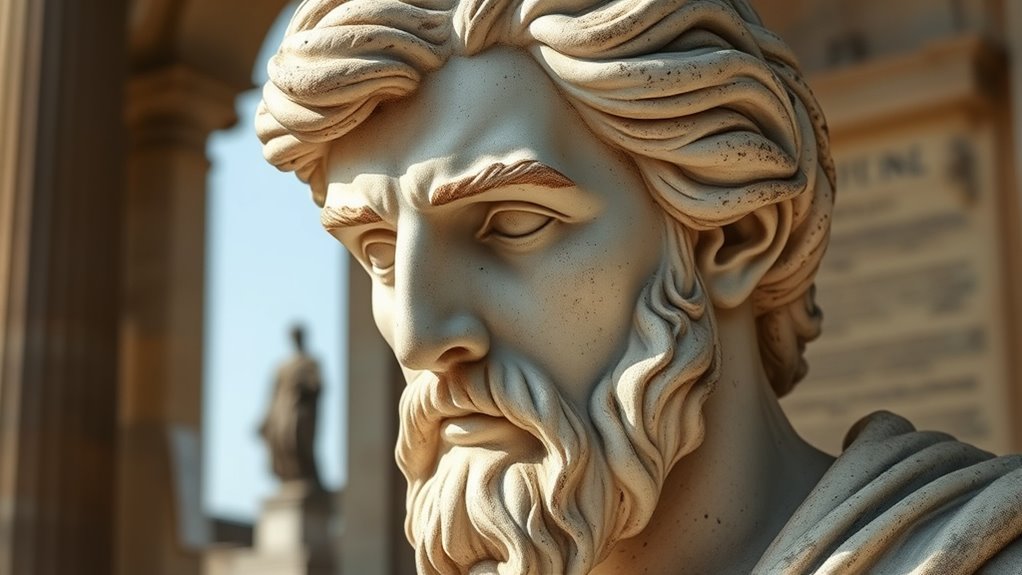
The principles of ancient Greek philosophy, especially Stoicism, continue to shape modern practices of self-control, resilience, and virtue. Today, you apply these ideas through techniques like mindful reflection, emotional regulation, and focusing on what you can control.
This legacy influences how you handle challenges, build mental toughness, and cultivate inner peace. To deepen your understanding, consider these key aspects:
- Practicing daily reflection to align actions with core values
- Using negative visualization to prepare for setbacks
- Focusing on internal virtues rather than external outcomes
Frequently Asked Questions
How Did Stoicism Influence Roman Philosophy and Later Western Thought?
You see, Stoicism profoundly shaped Roman philosophy by emphasizing virtue, self-control, and rationality, which Romans adopted in their governance and personal lives.
This influence extended into later Western thought, inspiring ideas about ethics, resilience, and the importance of inner strength.
You might notice its legacy in modern self-help, psychology, and even leadership, where the focus on emotional resilience and rational decision-making remains central.
What Are the Main Differences Between Stoic and Epicurean Philosophies?
You notice that Stoic and Epicurean philosophies differ mainly in their views on happiness and how to achieve it.
Stoics believe virtue and living in harmony with nature lead to tranquility, emphasizing self-control and resilience.
Epicureans, on the other hand, focus on seeking pleasure and avoiding pain, valuing simple pleasures and friendship.
While Stoics aim for inner strength, Epicureans pursue a pleasant, balanced life.
How Did Stoics Interpret the Concept of Divine Providence?
You see that the Stoics interpret divine providence as an active, guiding force in the universe. They believe everything happens according to a rational plan, orchestrated by a divine reason or logos.
This means you should trust that events unfold for a reason, even if you don’t understand it immediately. By aligning your will with this divine order, you can find peace and live in harmony with nature’s rational design.
What Role Did Astrology Play in Ancient Stoic Natural Philosophy?
Did you know that around 30% of ancient Stoics believed astrology explained the universe’s order? You’d find that astrology played a significant role in their natural philosophy, as they saw celestial bodies influencing everything on Earth.
They believed the stars and planets reflected divine rationality, guiding natural events and human fate. This cosmic harmony reinforced their view that understanding the heavens could help you comprehend the universe’s rational design.
How Is Stoic Ethics Applied in Contemporary Psychological Practices?
You can apply Stoic ethics today by focusing on controlling what you can and accepting what you can’t. Practice mindfulness to stay present and manage your reactions to life’s challenges.
Cultivate virtues like wisdom, courage, justice, and temperance to guide your decisions. By embracing these principles, you develop resilience and emotional stability, helping you navigate stress and setbacks more effectively.
This approach leads to a calmer, more fulfilled life.
Conclusion
By exploring the roots of Stoicism in ancient Greek philosophy, you see how ideas like virtue, reason, and harmony with nature shape your life today. Remember, “A wise man learns more from his enemies than a fool from his friends,” highlighting the importance of reflection. Embracing these ancient teachings helps you find resilience and clarity. Ultimately, understanding Stoic roots empowers you to live with purpose, patience, and inner peace.
